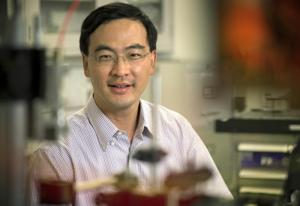Jan 19 2015
Weidong Zhou, a University of Texas at Arlington electrical engineering professor, has been elected a Fellow of SPIE, the international society for optics and photonics.
 Weidong Zhou, UT Arlington electrical engineering professor, was elected Fellow at SPIE. Credit: UT Arlington
Weidong Zhou, UT Arlington electrical engineering professor, was elected Fellow at SPIE. Credit: UT Arlington
Zhou was one of 58 new Fellows elected to the society, which was founded in 1955. He was recognized for "important contributions to nanophotonics, including nano-membranes and photonic crystal lasers."
Khosrow Behbehani, dean of the College of Engineering, said recognition of Dr. Zhou by a highly prestigious professional society reflects the excellence of his work.
"He has excelled on the research front, in the classroom and as a collaborator with colleagues," Behbehani said. "His work with photonic crystals holds promise for increasing the speed of data transfer. His work provides technological advantages that can help keep our country competitive."
The SPIE Fellows Committee fields nominations and recommends nominees for consideration by the SPIE Board of Directors for election.
Shanhui Fan, an electrical engineering professor at Stanford University, wrote the nominating letter for Zhou, noting: "Professor Zhou has built a world-class research program that is excellent and very active in the areas of nanophotonics, photonic crystals and flexible on-chip photonics and electronics."
Fan added that Zhou had made pioneering contributions to these fields and has been published in Nature Photonics. He described Zhou as one of the leading figures in the field of photonics, having published more than 230 archived journal articles.
Zhou said he is honored and humbled by being named a Fellow.
"It's especially gratifying because your colleagues are electing you," Zhou said.
To date, more than 1,000 SPIE members have been elected as Fellows. Boasting more than 18,000 members worldwide, SPIE was founded as the Society of Photographic Instrumentation Engineers. It is the most recognized and largest association for optics and photonics.
The nonprofit organization provided $3.2 million in support of education and outreach programs in 2013, including about $396,000 in scholarships and more than $90,000 in support of photonics-related education and outreach projects.